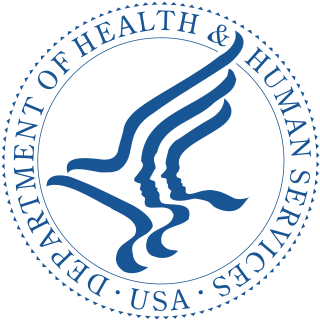
The United States Department of Labor (DOL) is one of the executive departments of the U.S. federal government. It is responsible for the administration of federal laws governing occupational safety and health, wage and hour standards, unemployment benefits, reemployment services, and occasionally, economic statistics. It is headed by the Secretary of Labor, who reports directly to the President of the United States and is a member of the president's Cabinet.

The United States secretary of health and human services is the head of the United States Department of Health and Human Services, and serves as the principal advisor to the president of the United States on all health matters. The secretary is a member of the United States Cabinet. The office was formerly Secretary of Health, Education, and Welfare. In 1980, the Department of Health, Education, and Welfare was renamed the Department of Health and Human Services, and its education functions and Rehabilitation Services Administration were transferred to the new United States Department of Education. Patricia Roberts Harris headed the department before and after it was renamed.

The Texas Department of Assistive and Rehabilitative Services (DARS) was a Texas state agency that was part of the Texas Health and Human Services Commission. The agency worked with Texans with disabilities and children with developmental delays to improve the quality of their lives and to enable their full participation in society.
The Workforce Investment Act of 1998 was a United States federal law that was repealed and replaced by the 2014 Workforce Innovation and Opportunity Act.
The Randolph–Sheppard Act, 20 U.S.C. § 107 et seq., is a federal law which mandates a priority to blind persons to operate vending facilities on Federal property.

The Rehabilitation Act of 1973 is a United States federal law, codified at 29 U.S.C. § 701 et seq. The principal sponsor of the bill was Rep. John Brademas (D-IN-3). The Rehabilitation Act of 1973 replaces preexisting laws to extend and revise the authorization of grants to States for vocational rehabilitation services, with special emphasis on services to those with the most severe disabilities, to expand special Federal responsibilities and research and training programs with respect to individuals with disabilities, to establish special responsibilities in the Secretary of Health, Education, and Welfare for coordination of all programs with respect to individuals with disabilities within the Department of Health, Education, and Welfare, and for other purposes.

The Education for All Handicapped Children Act (sometimes referred to using the acronyms EAHCA or EHA, or Public Law 94-142 was enacted by the United States Congress in 1975. This act required all public schools accepting federal funds to provide equal access to education and one free meal a day for children with physical and mental disabilities. Public schools were required to evaluate children with disabilities and create an educational plan with parent input that would emulate as closely as possible the educational experience of non-disabled students. The act was an amendment to Part B of the Education of the Handicapped Act enacted in 1966.
The National Institute on Disability, Independent Living, and Rehabilitation Research (NIDILRR) is a United States governmental agency that provides leadership and support for a comprehensive program of research related to the rehabilitation of individuals with disabilities. It was previously The National Institute on Disability and Rehabilitation Research, a subordinate of the Office of Special Education and Rehabilitative Services (OSERS) — part of United States Department of Education.
The Federal Security Agency (FSA) was an independent agency of the United States government established in 1939 pursuant to the Reorganization Act of 1939. For a time, the agency oversaw food and drug safety, education funding, administration of public health programs, and the Social Security old-age pension plan.
The Rehabilitation Services Administration (RSA) is a federal agency under the United States Department of Education, Office of Special Education and Rehabilitative Services, and is headquartered within the Department of Education in Washington, D.C. It was established to administer portions of the Rehabilitation Act of 1973. Its mission is to provide leadership and resources to assist state and other agencies in providing vocational rehabilitation (VR) and other services to individuals with disabilities to maximize their employment, independence and integration into the community and the competitive labor market.
Section 504 of the Rehabilitation Act of 1973, is American legislation that guarantees certain rights to people with disabilities. It was one of the first U.S. federal civil rights laws offering protection for people with disabilities. It set precedents for subsequent legislation for people with disabilities, including the Virginians with Disabilities Act in 1985 and the Americans with Disabilities Act in 1990.

Originally created as the Bureau of the Education of the Handicapped, the Office of Special Education Programs (OSEP) is part of the U.S. Department of Education. OSEP provides leadership and support for professionals working with children with disabilities. Another critical role of OSEP is to protect the educational rights of children with disabilities from age three through twenty-one. OSEP is supervised by the Office of the Deputy Secretary of Education through the Office of Special Education and Rehabilitative Services (OSERS).
Assistive Technology Acts provide federal funding from the U.S. Department of Education to each state and territory to support "State efforts to improve the provision of assistive technology to individuals with disabilities of all ages through comprehensive statewide programs of technology-related assistance." Assistive Technologies are equipment, items or devices used to improve or keep the functionality of an individual with a disability. This will allow an individual with a disability to be more independent in life, this includes: education, recreation, and any daily activity. The services being offered for Assistive Technology include being able to use AT devices, assessment for the devices, and any maintenance included, such as customization, repair, and training. Under the Assistive Technology laws, federal grants are granted to each state to fund an Assistive Technology Act Project (ATAP) which provide services for individuals with disabilities, their families, guardians and more for their life span. The act, first passed in 1988, expires each years and needs to be continuously renewed to ensure the services can still be used.

The California Department of Rehabilitation (DOR) is a California state department which administers vocational rehabilitation services. It provides vocational rehabilitation services and advocacy from over 100 locations throughout California seeking employment, independence, and equality for individuals with disabilities. The DOR was established on October 1, 1963.

The Wisconsin Department of Health Services (WisDHS) is a governmental agency of the U.S. state of Wisconsin responsible for maintaining public health. It administers a wide range of services in the state and at state institutions, regulates hospitals and care providers, and supervises and consults with local public health agencies. Its responsibilities include public health; mental health and substance abuse; long-term support and care; services to people with disabilities, medical assistance, and children’s services; aging programs; physical and developmental disability services; blindness disability programs; operation of care and treatment facilities; quality assurance programs; nutrition supplementation programs; medical assistance; and health care for low-income families, elderly, and the disabled.

The Wisconsin Department of Workforce Development (DWD) is an agency of the Wisconsin state government responsible for providing services to Wisconsin workers, employers, and job-seekers to meet Wisconsin's workforce needs. To effect its mission, the Department administers unemployment benefits and workers' compensation programs for the state of Wisconsin; ensures compliance with state laws on wages and discrimination; provides job resources, training, and employment assistance for job-seekers; and engages with employers to help them find and maintain adequate staffing for their businesses.

The Workforce Innovation and Opportunity Act (WIOA) is a United States public law that replaced the previous Workforce Investment Act of 1998 (WIA) as the primary federal workforce development legislation to bring about increased coordination among federal workforce development and related programs.

Edwin W. Martin Jr. is a policymaker in the area of education for people with disabilities. He served as congressional committee staff and in the Johnson, Nixon, Ford and Carter administrations. He was instrumental in drafting the Education of All Handicapped Children Act (1975). When the Department of Education was created in 1979–1980, Martin served as the first Assistant Secretary of Education for Special Education and Rehabilitative Services.

Rebecca A. Hare Cokley is an American disability rights activist and public speaker who is currently the first U.S. Disability Rights Program Officer for the Ford Foundation. Prior to joining Ford, Cokley was the founding director of the Disability Justice Initiative at the Center for American Progress. During the Obama Administration, Cokley served as the executive director of the National Council on Disability.









